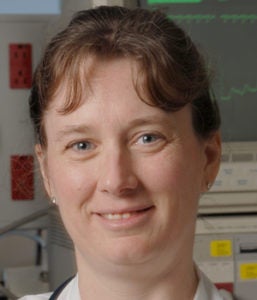3Qs with Dr. Alie Scholes, SM ’12
 Dr. Alison Scholes is an emergency medicine physician and board member at Saint Luke’s Health System in Kansas City, MO. Throughout the pandemic Dr. Scholes has been working within her health system and physician group to create pandemic response measures, while continuing to serve as an emergency room physician.
Dr. Alison Scholes is an emergency medicine physician and board member at Saint Luke’s Health System in Kansas City, MO. Throughout the pandemic Dr. Scholes has been working within her health system and physician group to create pandemic response measures, while continuing to serve as an emergency room physician.
Q1: How has COVID-19 changed day-to-day emergency department work? Have you reorganized in order to treat COVID patients and non-COVID emergencies?
When COVID arrived, we started right away with some pretty aggressive measures. We immediately started a no-visitor policy at all our hospitals, we shut down all of our elective surgeries. Our clinics were ramped up to go to telemedicine. We had a screening area right in the front where you came in, you got your temperature taken, and were given a mask.
We turned our decontamination shower area into a COVID ER. Anybody who had to be admitted who was a COVID PUI [persons under investigation] would go directly to the COVID floor from there, bypassing the ER completely. By doing this, we limited exposure for everybody. Our hospital alone has 6,500 employees. In our entire health system, we’ve only had one staff member become positive. I think the lack of sick people on the staff speaks volumes to the way our preparation went and because we did it so early. We did it long before anybody was doing anything in town. They all thought we were crazy.
We also shut down all the ORs except for emergency cases. We also took all of the anesthesia machines that have ventilators on them, and moved them so the anesthesiologists could work in tandem with the intensivists and school them on how to use the anesthesia machines as ventilators. That more than doubled the number of ventilators available.
Q2: Are you seeing the resumption of non-COVID ER duties? Are you concerned about delayed fallout in terms of people’s health?
Our emergency room volumes are going back up. Right now, a lot of that diagnosis and care of COVID is happening more on a community basis. I think for the ER, it’s just important to keep up our vigilance. Our city has opened up. You can go to a restaurant now—which I find shocking—but you can’t visit your family member who’s got appendicitis at Saint Luke’s Hospital. We’re not changing any of those policies until we have a couple of weeks of decreasing death rates. So I think these rules are going to be in place awhile, probably the remainder of the summer.
Because of the thrombotic nature of COVID and how it affects vasculature, we have definitely seen increased numbers of stroke in people who shouldn’t have stroke. We’re seeing that, and we’re seeing people who delay: people who when they get chest pain are too scared to go to the hospital. We definitely saw increased numbers of delayed presentation for stroke, heart attack, and appendicitis.
Q3: How do you and other emergency staff deal with the mental strain of this work?
Well, I’m a really social person, and I have an incredibly close family. My sister lives across the street from me. I actually diagnosed the first person in Jackson County with COVID. When that happened, I was like, “You know what? I should probably not be around the family because I might be the vector.” So I shut down all of our family gatherings, which has been really, really hard. Every week we have at least three family Zoom calls. That’s really been super important for me.
The only other people who know exactly what I’m dealing with are the nurses that I work with, the other doctors that I work with. We have a group text with all the women physicians in my group. The conversation on that has ramped up quite a bit because everybody’s not only a doctor and doing this but they’re also moms, and so we have all these mom issues. My younger colleagues have had to be homeschooling on top of all this, which would be insane to me.
As an ER doctor, I don’t feel like this was as big an ordeal for me maybe as it would be for physicians in other fields of medicine. We’re sort of expected to adapt to weird, wacky situations. It seemed like, “Well, this is what I’m supposed to do.” I definitely am weirded out by all this “health care hero” thing. Well, of course, I’m working during a pandemic. I’m a freaking ER doctor! That’s not heroic. That’s my job.
